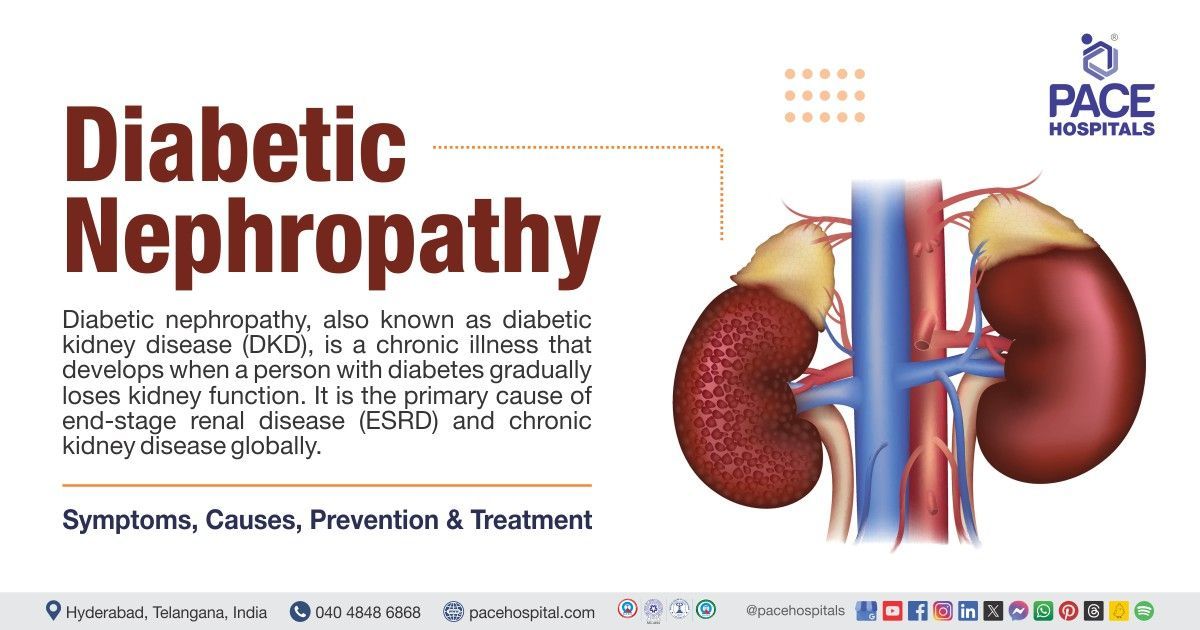Best Diabetic Neuropathy Specialist in Hyderabad for Advanced Treatment
PACE Hospitals
✅ Recommended by 9,452 Happy Patients. Get hassle-free appointments with Best diabetic neuropathy specialist doctors.
Dr. S Pramod Kumar
MBBS, DNB (General Medicine), DM (Neurology)
Experience : 10+ years
Consultant Neurophysician & Neuromuscular Specialist
Specialist
Neurological conditions - epilepsy, stroke, headache, migraine, Parkinson's disease, movement disorders, peripheral neuropathy, optic neuritis, neuroimmunology, dementia, and electrophysiology
Expertise
Skilled in infectious disease management, Brain Tumor Treatment, critical care management, and the treatment of low back pain and neck pain, conducting various diagnostic tests, including EEG, ENMG, VEP, and AFT
Consultation Details
Languages Spoken: English, Hindi, Telugu
Timing: Mon to Sat - 9 am to 6 pm
Location: PACE Hospitals, HITEC City
Dr. U L Sandeep Varma
MBBS, M.S. (General Surgery), M.Ch (Neurosurgery), Post Doctoral Fellowship in Minimal Invasive and Advanced Spine Surgery
Experience : 10+ years
Consultant Brain and Spine Surgeon
Specialist
Brain and spine surgery, treating various forms of complex neurological conditions such as brain tumours, spinal cord tumours, cerebrovascular aneurysms, stroke, epilepsy, head trauma, spinal disorders, hydrocephalus, craniopharyngiomas neurological infections, neurological pain syndrome, complex spinal deformities, neurological trauma etc.
Expertise
Brain Tumor Surgery, Cervical and Lumbar disc disease, Scoliosis, Brain and Spine tumors, Skull base neurosurgery, Hydrocephalus, Epilepsy, Cranio Vertebral junction surgeries, Spine injuries and Neurotrauma.
Consultation Details
Languages Spoken: English, Hindi, Telugu
Timing: Mon to Sat - 9 am to 6 pm
Location: PACE Hospitals, HITEC City
Experienced Diabetic Neuropathy Doctor in Hyderabad for Nerve Pain Management
PACE Hospitals is recognized for having some of the best doctors for diabetic neuropathy in Hyderabad, India, known for their expertise in diagnosing and managing diabetic nerve damage and related complications. Our experienced team of diabetic neuropathy specialists in Hyderabad provides personalized, patient-focused care to treat nerve pain, tingling, numbness, burning sensation, and muscle weakness caused by diabetic nerve disease.
Equipped with advanced diagnostic tools, including diabetic neuropathy tests such as nerve conduction studies, electromyography (EMG), and quantitative sensory testing, PACE Hospitals ensures accurate evaluation of the severity and type of nerve damage. Whether it’s peripheral, autonomic, or focal neuropathy, our diabetic neuropathy doctors in Hyderabad develop tailored treatment plans that align with each patient’s condition and diabetic profile.
We offer a comprehensive range of diabetic neuropathy treatments, including blood sugar control, pain-relief medications, nutritional therapy, physiotherapy, and advanced options such as nerve blocks and transcutaneous electrical nerve stimulation (TENS). For patients with severe diabetic nerve damage, we also offer multidisciplinary care involving endocrinologists, neurologists, and pain management experts.
With a strong focus on clinical excellence and compassionate care, PACE Hospitals is a trusted destination for patients seeking the best diabetic neuropathy doctor in Hyderabad. Our goal is to manage symptoms, prevent disease progression, and improve quality of life for individuals living with diabetic nerve disease.
Frequently Asked Questions (FAQs) on Diabetic Neuropathy
Can diabetic neuropathy be reversed?
Diabetic neuropathy is generally not reversible once significant nerve damage has occurred. However, in early stages, strict glycemic control and lifestyle interventions may partially improve nerve function and reduce symptom severity. Clinical studies show that aggressive diabetes management can halt progression and, in some cases, lead to modest improvement in nerve conduction. Complete reversal is rare, but early intervention plays a critical role in preserving function.
A specialist for diabetic neuropathy at PACE Hospitals can help identify reversible stages and implement evidence-based interventions to preserve nerve health. Early diagnosis remains key to optimizing outcomes and preventing complications.
Can diabetic neuropathy cause paralysis?
Paralysis is rare in diabetic neuropathy but may occur in certain subtypes such as proximal or focal neuropathy. These forms can cause muscle weakness, especially in the thighs, hips, or localized areas like the facial or cranial nerves. The weakness may resemble partial paralysis and significantly impair mobility or function. Early recognition and treatment are essential to prevent permanent loss of muscle strength or motor function.
An experienced diabetic neuropathy doctor at PACE Hospitals can detect early muscle weakness and prevent functional decline.
What happens if diabetic neuropathy is left untreated?
Untreated diabetic neuropathy increases the risk of foot ulcers, infections, and lower limb amputations. It can lead to balance issues and falls, autonomic dysfunction, and heightened mortality risk.
Studies show that moderate-to-severe neuropathy is linked to increased progression of diabetic complications such as retinopathy and nephropathy. Early detection and intervention are essential to mitigate long-term morbidity.
When should I see a doctor for diabetic neuropathy?
A medical consultation is advised if burning, tingling, numbness, weakness, or pain in the feet or hands interferes with daily activities or sleep, or if a foot sore fails to heal. Autonomic symptoms—such as urinary, digestive, or sexual dysfunction—also warrant evaluation. Prompt assessment facilitates early intervention and prevents further complications. Clinical recommendations support initiating diagnostic evaluation when symptoms begin or diabetes duration exceeds guidelines thresholds for screening.
What is diabetic neuropathy?
Diabetic neuropathy is a form of nerve damage caused by prolonged hyperglycemia in individuals with diabetes. It typically affects the peripheral nerves in a distal-to-proximal pattern, most commonly in the feet and hands. Symptoms include pain, tingling, numbness, and burning sensations. Several subtypes exist, including peripheral, autonomic, proximal, and focal neuropathies. Early diagnosis and glucose control are essential to limit progression and prevent complications such as foot ulcers or infection.
For early evaluation and expert care, consult the
best
doctor for diabetic neuropathy at PACE Hospitals, where diagnosis is supported by advanced testing and multidisciplinary treatment. Comprehensive management helps slow progression and improves long-term outcomes.
How to cure diabetic neuropathy?
There is no established cure for diabetic neuropathy. Treatment focuses on optimising blood glucose levels, alleviating symptoms, and preventing secondary complications. Evidence-based interventions include glycemic control, pharmacologic symptom management, foot care, and patient education. Lifestyle changes, including exercise and diet, may also contribute to symptom improvement. Research continues into potential disease-modifying therapies, but current strategies are primarily aimed at management rather than cure.
For comprehensive management plans, meet the diabetic neuropathy doctors in Hyderabad, India, at PACE Hospitals, who specialize in slowing disease progression. Multidisciplinary teams offer personalised care plans for long-term symptom relief.
How long does diabetic neuropathy take to develop?
Diabetic neuropathy usually develops over several years, especially with chronic hyperglycemia. Risk increases with the duration of diabetes and the degree of glycemic variability. In type 2 diabetes, symptoms may be present at diagnosis, while in type 1 diabetes, neuropathy often appears after five or more years. Other contributing factors include hypertension, dyslipidemia, and smoking. Progression tends to be gradual, often starting with mild sensory symptoms.
For monitoring and prevention, consult
experts in diabetic neuropathy treatment in Hyderabad, India at PACE Hospitals, where advanced screening protocols support early intervention. Risk-based evaluations help delay or prevent disease progression.
What does diabetic neuropathy pain feel like?
Diabetic neuropathy pain is commonly described as burning, stabbing, tingling, or electric shock-like sensations. The pain often begins in the feet and hands and may worsen at night. In some cases, individuals experience heightened sensitivity (allodynia) or a mix of numbness and pain. The quality and intensity of pain vary depending on the type and severity of nerve damage. These symptoms significantly impact daily functioning and quality of life.
A
diabetic neuropathy specialist doctor at PACE Hospitals can assess pain type and provide tailored pain management strategies. Timely intervention reduces discomfort and improves daily living quality.
Do diabetic socks help with neuropathy?
Diabetic socks help manage foot-related complications associated with diabetic neuropathy but do not treat the neuropathy itself. These socks are designed to minimize pressure, improve circulation, and prevent blisters or injuries in patients with reduced foot sensation. Features such as non-binding tops, moisture-wicking fabric, and seamless construction make them suitable for daily use. Clinical guidelines recommend them as part of a comprehensive foot care strategy in patients with peripheral neuropathy.
Consult a
diabetic neuropathy doctor specialist at PACE Hospitals for a full preventive foot care plan tailored to neuropathy stages. Preventive measures reduce the risk of ulcers and long-term complications.
What is the treatment for diabetic neuropathy?
Treatment focuses on blood sugar control, symptom management, and complication prevention. This includes pharmacologic therapy using approved drug classes, lifestyle changes, and regular foot care. Multidisciplinary care involving endocrinologists, neurologists, and physical therapists is often recommended. Clinical guidelines support individualized treatment plans that consider pain severity, comorbid conditions, and functional goals. Early intervention improves outcomes and reduces long-term disability.
A
diabetic neuropathy treatment specialist at PACE Hospitals provides individualized care based on current clinical guidelines. Coordinated management improves functional independence and symptom control.
How fast can diabetic neuropathy develop?
Diabetic neuropathy may develop gradually over years or more rapidly in individuals with uncontrolled diabetes. In some cases, symptoms may appear within months of sustained hyperglycemia. Acute-onset forms such as diabetic amyotrophy or cranial mononeuropathy can develop quickly, though these are less common. Risk factors that accelerate development include poor glycemic control, metabolic syndrome, and smoking. Regular screening is advised for early detection and management.
The
best doctor for diabetic neuropathy in Hyderabad, India is available at PACE Hospitals for early detection and risk-based intervention.Timely care helps delay progression and protect long-term nerve function.
Can acupuncture help diabetic neuropathy?
Acupuncture has shown potential benefits as a complementary therapy for diabetic neuropathy. Some clinical trials and meta-analyses report improvements in pain, tingling, and nerve conduction when acupuncture is combined with conventional treatment. The proposed mechanisms include enhanced circulation, reduced inflammation, and stimulation of endogenous pain-relief pathways. While initial findings are promising, further large-scale, high-quality studies are needed to confirm long-term efficacy and establish standardized treatment protocols.
How do doctors diagnose diabetic neuropathy?
Diagnosis typically begins with a detailed patient history and focused physical exam that includes monofilament testing for pressure sensation and tuning fork assessment for vibration perception. Quantitative sensory testing and sudomotor function assessments can detect early neuropathy. Nerve conduction studies and electromyography are reserved for atypical or uncertain cases. Early detection via these validated tools correlates with better outcomes and guides management.
Can diabetic neuropathy be prevented?
Prevention strategies focus on rigorous blood sugar control, lifestyle modifications, and routine foot care. Guidelines recommend regular monitoring of glucose and managing hypertension or dyslipidemia. Annual neuropathy screening—via clinical exams and sensory testing—allows timely recognition. Patient education on foot inspection, footwear use, and glycemic management reduces neuropathy onset and lowers complication risks, including ulcers and amputations.
Is diabetic neuropathy permanent?
Diabetic neuropathy is frequently progressive and often irreversible once structural nerve damage is established. While early-stage neuropathy may show partial improvement with intensive glycemic control, lifestyle changes, and symptomatic management, long-term nerve repair is uncommon. Most established cases persist despite treatment, though symptom progression can be slowed. The emphasis is placed on early intervention to preserve function rather than full restoration of nerve health.
Which type of diabetic neuropathy is most common?
The most frequently occurring form is distal symmetrical polyneuropathy (DSPN), which affects approximately 50% of patients with type 2 diabetes after a decade and 20–25% of newly diagnosed cases. It typically presents in a glove-and‑stocking distribution, causing sensory loss and neuropathic pain in the feet and hands. DSPN contributes most to diabetic foot complications, morbidity, and decreased quality of life.
Can diabetic neuropathy affect balance or walking?
Yes, diabetic peripheral neuropathy often impairs balance and gait. Loss of sensory and motor function in the lower limbs reduces proprioception and muscle strength, leading to slower walking speed, wider step width, and increased fall risk. Studies show a significant correlation between neuropathy severity and functional mobility decline. Rehabilitation interventions—such as balance exercises or gait training—can improve safety and reduce falls.
Does diabetic neuropathy affect sleep?
Diabetic neuropathy frequently disrupts sleep, especially when painful sensations worsen at night. Patients may experience insomnia, frequent awakenings, or conditions such as restless legs syndrome or sleep apnea. Pain severity is associated with poorer sleep quality and reduced overall functioning. The interplay between neuropathy, sleep disorders, and glycemic instability may further degrade quality of life. Managing nerve pain is essential to improve sleep and downstream metabolic control.
What our patients have to say
Related Articles
Why choose PACE Hospitals?
- A Multi-Super Speciality Hospital.
- NABH, NABL, NBE & NABH - Nursing Excellence accreditation.
- State-of-the-art Liver and Kidney transplant centre.
- Empanelled with all TPAs for smooth cashless benefits.
- Centralized HIMS (Hospital Information System).
- Computerized health records available via website.
- Minimum waiting time for Inpatient and Outpatient.
- Round-the-clock guidance from highly qualified super specialist doctors, surgeons and physicians.
- Standardization of ethical medical care.
- 24X7 Outpatient & Inpatient Pharmacy Services.
- State-of-the-art operation theaters.
- Intensive Care Units (Surgical and Medical) with ISO-9001 accreditation.
Share on
Request an appointment
Fill in the appointment form or call us instantly to book a confirmed appointment with our super specialist at 04048486868
Appointment request - health articles
Recent Articles














